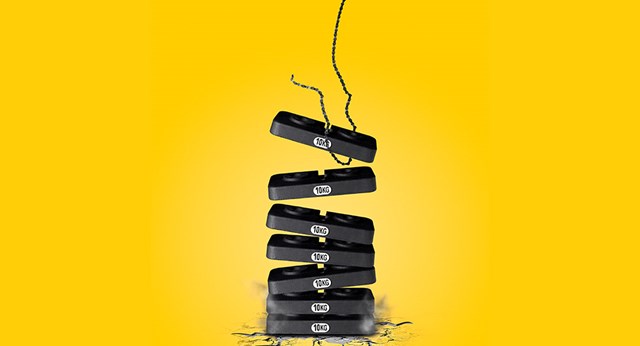
Walk into any gym in the country and you’ll likely be privy to the weights room wisdom of fitness and nutrition “experts”, exchanging the latest in “bro” science as they yack between sets.
Mostly their patter is harmless, if misguided. Here’s a better option. Heed the advice of actual sports nutrition researchers, who work hard to uncover the scientific truth.
Here they debunk five food myths that could be hurting your training efforts.
Myth 1
If you hit the gym hungry, you’ll prep your body for maximum fat loss.
Some research suggests that if you exercise while your blood sugar and carb levels are low, your body will suck energy from fat reserves. But that’s not the best plan for high-intensity exercise, which fries the most lard, says nutritionist Dr Mike Roussell.
The real key to stoking your fat furnace: managing insulin.
Low-glycaemic foods (apples, peanuts, peaches) cause your body to release controlled doses of insulin, providing you with a steady stream of energy. High-glycaemic foods (white bread, pasta) cause insulin to spike, which can stimulate fat storage.
Fuel Smart First, build a base: two-and-a-half to three hours before a hard workout, eat a low-glycaemic meal of carbs, protein and healthy fats, says sports nutritionist Dr Christopher Mohr. Think quinoa, chicken, avocado.
Then, 30-45 minutes before you hit the gym, grab a low-glycaemic, 600-kilojoule snack, such as almond butter on a wrap or yoghurt with granola.
Click here for the ultimate 15-minute sweat session
Myth 2
Eating energy gel during a short workout is the best way to fuel it.
If you didn’t stick to your fuel-up plan earlier in the day, gels may help.
According to a Sports Medicine review, consuming carbs during a 45- to 60-minute high-intensity workout may enhance your performance by helping you fight fatigue.
But there’s a better strategy: eating carbs before exercise prevents your body from tapping its protein reserves, says Roussell. And it helps you power through your entire workout. Plus, carbs help manage your central nervous system’s perception of effort.
Fuel Smart Fifteen minutes before a hard workout, consume about 30 grams of easily digested carbs, such as those in gels or chews, Roussell says. Not a fan? Try a smoothie.
If you like your workouts caffeinated, save the buzz-inducing sports products (or coffee) for 30-60 minutes before exercise, says Dr Matthew Ganio, from the Department of Health, Human Performance and Recreation at the University of Arkansas.
Myth 3
When it comes to muscle building, it’s whey or the highway.
Nutritionists long thought that you needed all nine essential amino acids to build muscle. That’s why lifters scooped up whey, a cheese by-product that has a full set of amino acids and can be turned into powder.
But a 2013 University of Tampa study found that men who lifted three days a week for two months showed similar gains in muscle growth and strength whether they ate whey protein or rice protein powder after workouts.
Fuel Smart The bulk of your protein for bulking up should come from food sources for the added nutrients.
Try tossing whey, egg, rice or pea powder, which all deliver the amino acid trinity (leucine, isoleucine and valine), into your shakes.
Be sure to eat 2-3g of leucine per session for optimal muscle growth.
Myth 4
Antioxidants patch damaged muscles, so load up!
“Antioxidant supplements might do you more harm than good,” says Dr Mari Carmen Gomez-Cabrera, an antioxidant expert at the University of Valencia.
A 2014 study at the Norwegian School of Sport Sciences found that amateur athletes who took an antioxidant-and-vitamin supplement for six weeks reduced their endurance training efficiency compared with athletes who took none. A separate 2014 review saw similar effects in sprinters.
Why? Antioxidant supplementation may block formation of energy-producing mitochondria.
Fuel Smart Antioxidants may still protect you from heart disease and cancer. Buy colourful fruits and vegetables, says Gomez-Cabrera. The colours represent antioxidants with unique benefits.
We suggest 2-4 servings of green vegetables, 2-3 servings of starchy vegetables and legumes, and three servings of fruit daily.
Myth 5
Creatine supplementation is good for serious bodybuilders only.
The benefits go beyond the bench press: taking creatine may improve speed-training performance, aerobic activity and perhaps even neurological function, according to a study review in the Journal of the International Society of Sports Nutrition.
Why the aerobic boost? The study notes that creatine may raise blood plasma levels and help you use oxygen more efficiently.
It’s true that your body already produces about 1g of creatine a day and that you ingest additional creatine in animal proteins. But your diet may not be consistent from day to day, so supplement for a constant supply.
Fuel Smart After a loading phase of 20-25g of creatine daily for the time period recommended in the supplement directions, keep taking 3-5g a day.
This will help you derive the most benefits, according to the review.















